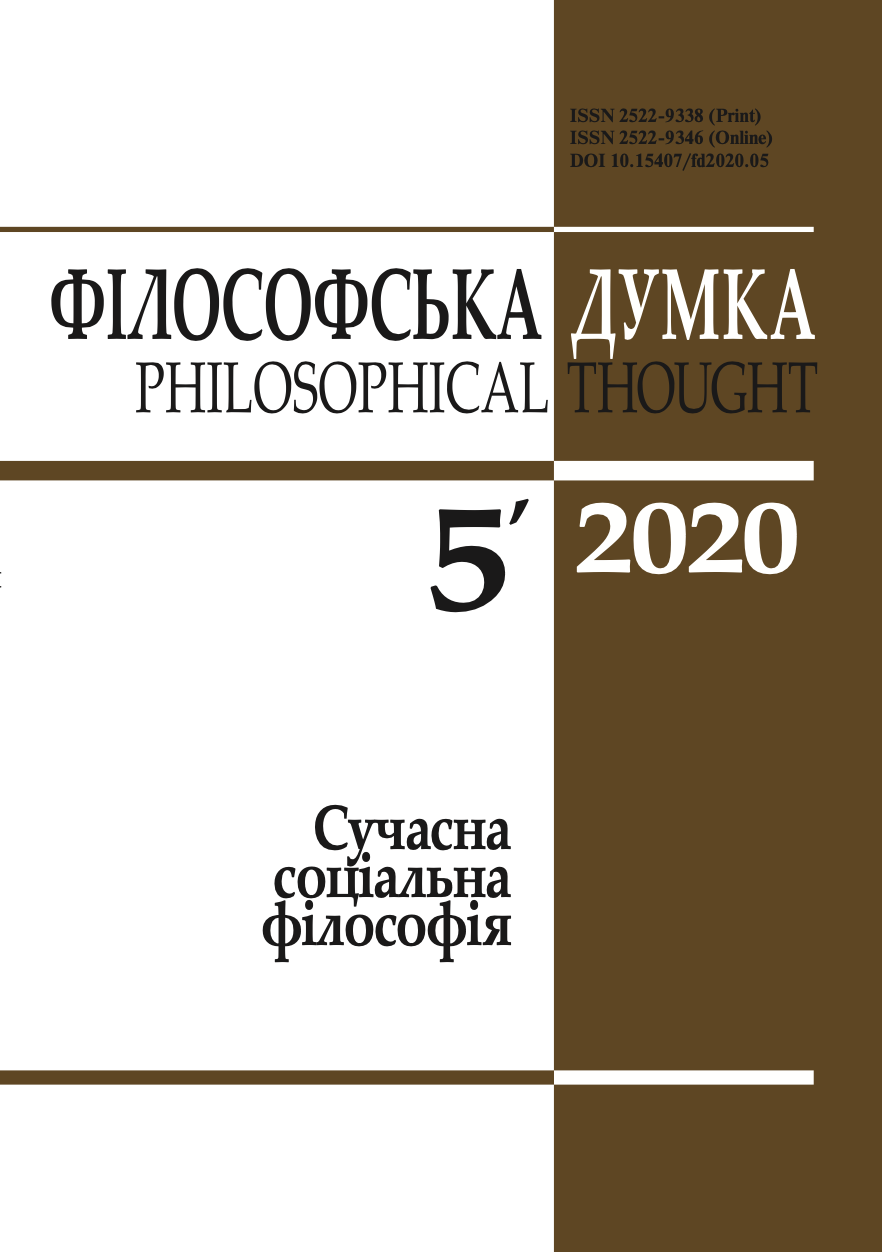GLOBALIZATION AND SINGULARITY: transformation of the foundations of modern society
DOI:
https://doi.org/10.15407/fd2020.05.087Keywords:
globalization, society, reality, humanity, singularity, network, information power, discourse, meaningAbstract
The article is devoted to the transformations of society in the era of globalization. The global world is seen as a consequence of the successful implementation of the world-historical the Project of Modernity. Its completion results in the loss of its intellectual authority and historical effective- ness. The principal quality of contemporary society became its globality. The paradoxical phe- nomenon of the world, that had ceased to be a reality, became an integrative shape of the global transformations. Visibility took the privileged place here. The degradation of reality is analyzed in its main forms: dematerialization of reality; decline and destruction of human sensory experience; destruction of the alive contacts with living beings and the capacity to empathize with somebody; the loss of the space of the human existence space features of a stable, predictable, structured se- mantic order. The consequence of that is the destruction of the foundations of the communities and society as a whole, which is fixed by the notion of their «vagueness». The correlation to this social metamorphosis is a new anthropological format — the singularity, which provides for the theoretical abolition of identity as a way for defining a man. It means the loss of an individual’s predictability and its determination as a social character. The network is the way through which the singularities interact, and swarms are the natural form of their association. Swarm is a histor- ically new, unstructured, but subordinated to common impulses union, which consists of points of activity of different intensity. The analysis of society is incomplete without taking into account its discursive-communicative nature. In the global world there is a decline in the discourses. The signs of that process are the lack of legitimacy in classical instances of the meaning (truth, good, beauty, etc.), the degeneration of thinking into mixing, changing criteria of significance (dominance of curiosity and impression), social degradation of the media. The main feature of these changes is the latest phenomenon of information power (the power of depersonalized in- formation space and information technology — those modes of circulation and use of informa- tion that became a determining factor in human life in the globalized world).
References
Aristotle (2000). Policy. [In Ukrainian]. Kyiv: Osnovy.
Bauman, Z. (2008). Fluid modernity. [In Russian]. St. Petersburg: Piter.
Beck, W. (2000). Risk society. On the way to another modern. [In Russian]. Moscow: Progress-Traditsia.
Baudrillard, J. (2000). In the shadow of the silent majority, or the end of the social. [In Russian]. Ekaterinburg: Ural University Publishing House.
Baudrillard, J. (2004). Simulacra and simulation. [In Ukrainian]. Kyiv: Osnovy.
Berger, P., Luckmann, T. (1972). Die gesellschaftliche Konstruktion der Wirklichkeit. Eine Theorie der Wissenssoziologie. 3. Aufl., Frankfurt a. M.: Fischer Taschenbuch Verlag.
Berger, P., Luckmann, T. (1995). Modernity, Pluralism and the Crisis of Meaning: The Orientation of Modern Man. Guetersloh: Bertelsmann Foundation Publishers.
Boehler, D. (2014). Responsibility for the future from a global perspective. [In Ukrainian]. Kyiv: Stylos.
Castells, M. (1996). The Rise of the Network Society: The Information Age: Economy, Society and Culture Vol. I. Cambridge, MA; Oxford, UK: Blackwell.
Decombe, W. (2015). The hassle of identity. [In Ukrainian]. Kyiv: Stylos.
Dyke, T. van (2013). Discourse and Power: Representation of Dominance in Language and Communication. [In Russian]. Moscow: PH 'Librokom'.
Jorgensen M., Phillips L. (2008). Discourse analysis: theory and method. [In Ukrainian]. Kharkiv: PH 'Gumanitarnyi tsentr'.
Epstein, M. (2004). Space sign: On the future of the humanities. [In Russian]. Moscow: A New Literary Review. Novoie literaturnoie obozrenie.
Giddens, E. (2004). Unrestrained world. How is globalization transforming our lives? [In Ukrainian]. Kyiv: Alterpres.
Heidegger, M. (1977). Die Zeit des Weltbildes In: M. Heidegger, Gesamtausgabe. Bd. 5 Holzwege. Frankfurt a. M: Vittorio Klostermann.
Laclau, E., Mouffe, C. (1985). Hegemony and Socialist Strategy. Towards a radical democratic Politics. London: Verso.
Latour, B. (2014). Partitioning the social: an introduction to actor-network theory. [In Russian]. Moscow: PH of the Higher School of Economics.
Markward, O. (2003). An era of alienation from the world? [In Russian]. Otechestvennyie zapiski, 6, 10-15.
McLuhan, M., Fiore, K. (2012). War and peace in the global village. [In Russian]. Moscow: AST, Astrel.
Robertson, R. (2000). Globalization: Social theory and Global culture. London. DOI: http://dx.doi.org/10.4135/9781446280447
https://doi.org/10.4135/9781446280447
Stiglitz, J. (2003). Globalization and Its Discontents. S.l.: Columbia University.
Welsh, W. (2004). Our postmodern modernism. [In Ukrainian]. Kyiv: Alterpres.
Downloads
-
PDF (Українська)
Downloads: 400
Published
How to Cite
Issue
Section
License
Authors who publish with this journal agree to the following terms:
- Authors retain copyright and grant the journal right of first publication.
- Authors are able to enter into separate, additional contractual arrangements for the non-exclusive distribution of the journal's published version of the work (e.g., post it to an institutional repository or publish it in a book), with an acknowledgement of its initial publication in this journal.
- Authors are permitted and encouraged to post their work online (e.g., in institutional repositories or on their website) prior to and during the submission process, as it can lead to productive exchanges, as well as earlier and greater citation of published work (See The Effect of Open Access).


